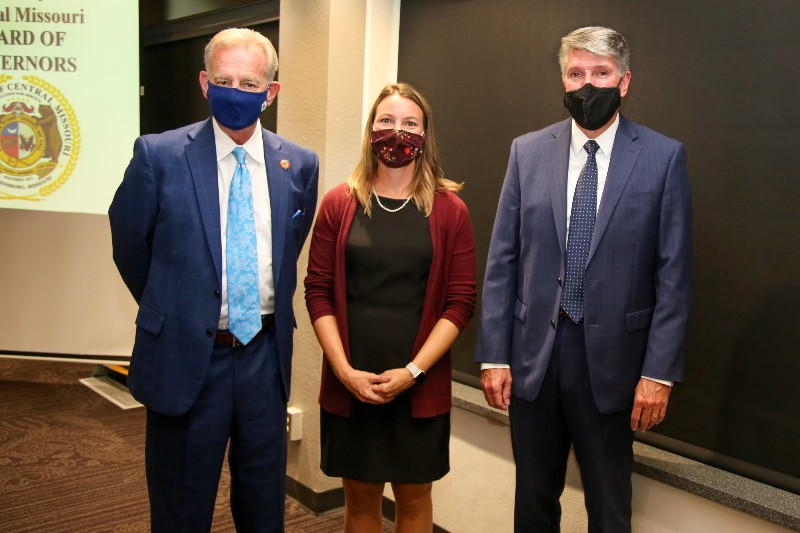Breadcrumb
Board Authorizes Health Insurance Renewal, Building Demolition, Upgrades
By Jeff Murphy, August 24, 2021

During the University of Central Missouri’s Board of Governors meeting Aug. 19, Board
President Stephen Abney, left, and University President Roger Best, right, congratulated
Krystle Gremaud on being named the National Academic Advising Association’s (NACADA) winner of the
Outstanding Advising Award – Faculty Advising. Gremaud is assistant professor and
program coordinator for Career and Technical Education in the School of Professional
Education and Leadership. NACADA’s Global Awards Program for Academic Advising honors
individuals and institutions that are making a significant impact on academic advising.
WARRENSBURG, MO – The renewal of employee health insurance and facility projects that
relate to the Fraternity Complex, Nattinger-Bradshaw Hall, Wood Hall, and the W.C.
Morris Science Building were approved by the University of Central Missouri Board
of Governors when it met in plenary session Aug. 19.
Bill Hawley, vice president for finance and operations and board treasurer, presented
the board a proposal to renew the university’s employee health insurance plan with
Blue Cross Blue Shield of Kansas City for 2022, which was approved. Hawley pointed
out that the university currently has one plan, known as the Exclusive Provider Option.
He noted that with several claims during the current year that reach the $150,000
stop loss amount, the university is facing a 14.5 percent increase in premiums to
maintain current benefit coverages for its employees and their families. Based on
current enrollment, total annual projected premium cost for the university in 2022
is approximately $11.7 million, resulting in a difference of about $1.5 million above
this year’s cost.
The proposal accepted by the board calls for UCM to fund the majority of the increase
while increasing the premium paid by employees by 2.34 percent across all levels of
coverage. UCM currently funds approximately 73 percent of the total premiums, but
beginning Jan 1, 2022, it will increase its funding to 76 percent of the total cost
for coverage. In 2022, this means an "Employee-Only" plan will cost $766.61 per month,
up from $669.50 in 2021. Effective in January, an employee with “Employee Only” coverage
will pay $34.26 per month of the total premium cost, which is less than $1 more per
month than they paid for their portion of the monthly premium in 2021. The employee
portion varies, however, depending on if they have a spouse, children, or their entire
family on their plan. Hawley said more information about health insurance coverage
will be shared with employees in the near future.
The board discussed a number of matters in committee sessions that were included on
the consent agenda approved during the plenary session. Among them was the award of
a $491,400 contract with Major Abatement and Demolition, Inc., Blue Springs, Missouri,
to provide all labor, materials, equipment, supplies, insurance, permit fees and other
items necessary for the completion of asbestos abatement and related work necessary
at the Fraternity Complex and Nattinger-Bradsahaw Halls. This is in addition to a
$901,200 contract with Dore & Associates Inc., Bay City, Michigan, to demolish these
structures. These costs will be covered through University Housing funds.
Hawley said federal and state regulations require asbestos removal before the demolition
of these facilities. The general conditions of these buildings are such that the costs
to renovate them significantly outweigh the benefits of doing so. The Fraternity Complex
is currently offline due to significant mechanical issues that are not cost-effective
to repair. Nattinger-Bradshaw is outdated and would require significant expenditures
for mechanical systems in order to continue its operation. Projections indicate UCM
will have sufficient housing inventory without these facilities for at least the next
10 years. Abatement and demolition is projected to be completed by January 2022.
A $851,400 contract was approved with Westport Construction Company, Clinton, for
the installation of high-quality recording studio spaces that comprise multiple control
rooms sharing central recording spaces on the ground floor of Wood Hall. In fall 2015,
the Music Technology program began to move into this area because it provided an
opportunity to better serve the needs of the program than its previous location in
Hudson Hall. The proposed renovations will primarily involve subdividing large rooms
into smaller spaces to allow musicians and engineers to see and hear each other via
windows and microphones, while remaining acoustically and environmentally isolated
from each other. These renovations facilitate and promote accepted safe practices
during times such as pandemic, but also support the longer-term recruiting and pedagogical
goals of the program. They afford students the opportunity to engage deeply with industry-standard
practices and techniques. Coronavirus Aid, Relief, and Economic Security Act (CARES)
funding will help make this project possible.
The board approved a $443,773 contract with Oke-Thomas and Associates Inc., Springfield,
Missouri, for labor and materials to install new acoustical ceiling panels, lights
and diffusers, and to clean the metal ceiling grid in Wood Hall. The existing ceiling
panels have bowed due to age, reducing the efficiency of the air-conditioning return
air plenum. Installing new acoustical ceiling panels will seal the air-conditioning
return air plenum and act as a fire barrier. This project is being funded through
Federal Budget Stabilization Funds (FBSF) that were released by Missouri Gov. Mike
Parson in January 2021.
A $509,027 project at W.C. Morris Science Building utilizing Diamond Contractors,
Inc., Lee’s Summit, Missouri, was approved with regard to the removal of single pane
rubber gasket windows, including mini-blades, and installation of new thermally broke
aluminum storefront windows with roller shades. This will improve the integrity of
the building, which was constructed in 1967, and reduce thermal gain inside the structure
to improve interior comfort and energy efficiency. Federal Budget Stabilization Funds
will pay for this project.








